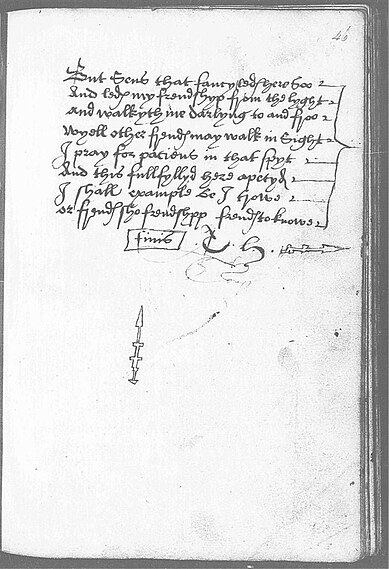The Devonshire Manuscript/Yff reason govern fantasye
|
Introduction | Contributors | Textual Introduction |
| ←Too yoye In payne my will | What helpythe hope of happy hape→ |
 |
 |
 |
f. [45r]
1 Yff reason govern fantasye
2 Soo that my fansy gugjugge a right
3 of all pleasurs to man erthlye
4 The cheist pleasur{{s}8} of delyght
5 ys only this that I resight
6 ffor frenshipe shoid to fynd at end
7 the frendshyp of a faythfull frend
8 Yff this be trewe trew ys this too
9 In all this pleasant enenes
10 the most displeasur{{s}8} chaunce may doo
11 ys onkendnes shoyd for kendnes
12 ffor frendly frendshyp frowernes
13 lykk as theon case plesant ys
14 lykwise A paynfull case ys this
15 Thes too Aprovyde aprove the thurde
16 That ys to say my self to be
17 In wofull caes for at A worde
18 Wher I sho frendshype & wold See
19 ffore frendshyp : frendshyp shoyd to me1
20 Ther fynd I frendship So fare fayntyd
21 That I ska skantly may Seme aquantyde
f. [45v]
22 By this word frendshpp now here sayde{d,}
23 my menyng to declare trewlye
24 I mene no whyt / the bornyng brayde{d,}
25 of ragyng love most Amoroslye
26 but onnest frendly com{_o}pany
27 And other love than this I knowe
28 here self nor yett no nother can show
29 And Sens here self no farder knowit
30 nor I my self but As I tell /
31 thowght fals report doth grass as growith2
32 that I loue here excedynde well
33 And that I loveshe takythe my love as yell
34 Sens I in ded mene no Such thyng
35 What hurt cold honest frendshyp bryng
36 Noo staryng eye nor herkenyng ere
37 cane hurt in this except that she
38 haue other frendes{es} that may not bare
39 In here preasens : preasens of me
40 And that for that here pleasur{{s}8} be
41 To sho vnkyndnes for non nother
42 But banyshe me to bryng in other
f. [46r]
43 But sens that fancy /3ledes{es} here soo
44 And ledes{es} my frendshyp from the lyght
45 and walkyth me darlyng to and froo
46 wyell other frendes{es} may walk in Sight
47 I pray for paciens in that spyt
48 And this fullfyllyd here apetyd
49 I shall example be I trowe
50 or frendes{es} sho frendshypp frendes{es} to knowe
finis T. H.
Notes & Glosses
edit 1. This may be the only instance of the use of a colon-type mark within the manuscript.
2. This phrase is resonant.
3. The virgule is a vertical bar.
Commentary
editEntered by TH1, the initials "T H" and "T. How" on 46r attribute the composition to Thomas Howard. The speaker describes the comfort of honest friendship, the disapproval of this friendship by others, and the quick growth of “fals report” by the lady’s “frendes” who cannot bear his presence by her. The grafted and rotten bough image is a common image in courtly lyrics. For other examples of this image in the manuscript, see "This rotyd greff will not but growe" (47v), “Nowe fare well love and theye lawes forever” (75r), and "Tanglid I was yn loves snare" (79v-80r).
TH1 makes later corrections in a different ink. Small flourishes shaped like the number two with a long tail appear at the end of almost every line.